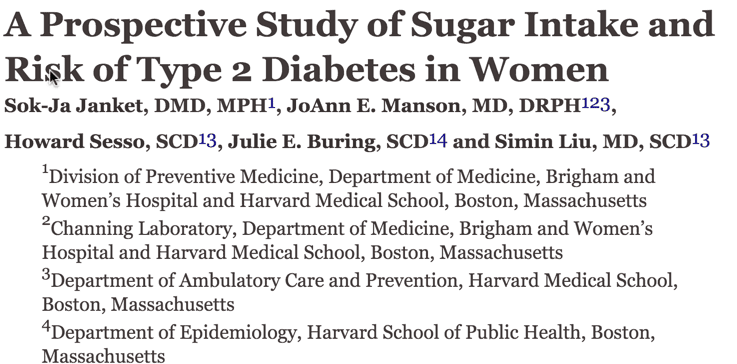
It’s very popular to blame sugar today, on all dietary problems. Just as 20 years ago we were in a low-fat mania, and fat was blamed for everything. Now sugar is blamed for everything.
So what I wanted to find out, is the time in between sugar intake and the risk of diabetes.
Does sugar cause diabetes?
 Almost 40,000 women completed detailed questionnaires about what they were eating.
Almost 40,000 women completed detailed questionnaires about what they were eating.
Portion sizes, and how often the food or drinks that were consumed was monitored. They had tested this questionnaire out earlier in other studies and found that it was pretty accurate. At least as far as these surveys go.
Each year, they asked the women if they had been diagnosed with type II diabetes. They verified the answers over 97% of the time against medical records.
Over about six years, almost 1000 cases of diabetes were diagnosed.
One important finding is that people who consume a lot of sugar also tend to consume more carbohydrates for their total calories.
That may sound obvious, but it’s not.
The person that is going to consume a lot of sweets and soft drinks are not going to eat as much fat as a total percentage of calories.
So here’s the kicker about sugar and diabetes.
Higher sugar consumption was linked to a lower incidence of diabetes
For high amounts of sucrose, there was a 16% decrease in being diagnosed with type 2 diabetes, in those eating the most sugar.
For high amounts of fructose, a 4% reduction.
For high amounts of glucose, a modest 4% increase in diagnosis of type 2 diabetes.
And for milk sugar, lactose, high consumption made no difference.
So much for the argument that consuming a lot of sugar causes diabetes. In fact, this study shows,
High sugar consumption leads to a modest decrease in the incidence of diabetes
This is in line with a theory that diabetes is caused by insulin resistance, and insulin resistance is caused by an overabundance of free fatty acids in the blood.
This is not the only study that shows higher sugar consumption leads to a decrease in the incidence of diabetes
Meyer…found significant inverse association between sugar intake and type 2 diabetes in their study.
That means the higher sugar intake, the lower the incidence of diabetes in that other study done by Meyer.
 Meyer found:
Meyer found:
Intakes of total carbohydrates, refined grains, fruit and vegetables, and soluble fiber and the glycemic index were unrelated to diabetes risk.
So much for all of the official recommendations.

http://care.diabetesjournals.org/content/26/4/1008.full
Carbohydrates, dietary fiber, and incident type 2 diabetes in older women
http://ajcn.nutrition.org/content/71/4/921.abstractijkey=9d6a314edca10fb07c6d18ca198a0ed9bbbe7ced&keytype2=tf_ipsecsha
